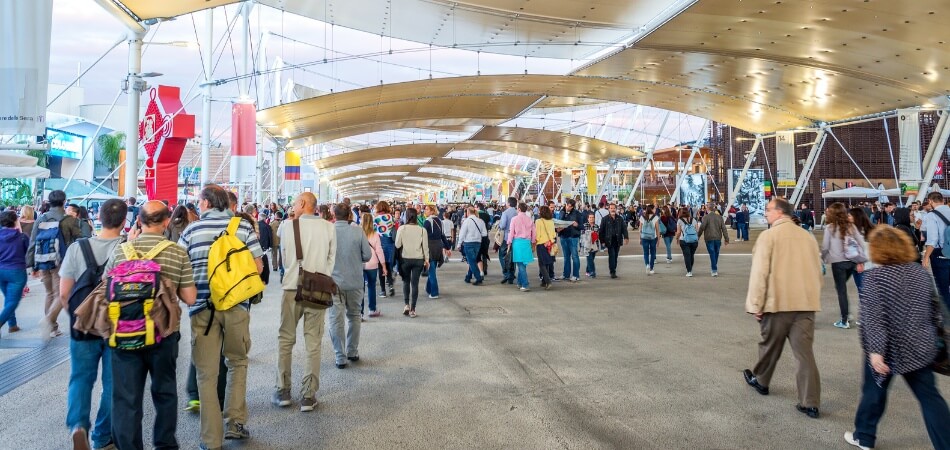The global community has always sought platforms to showcase achievements, exchange ideas, and build relations. Why is the Expo a big deal? It stands out as a monumental event in this quest.
By gathering countries worldwide, Expos offer a unique convergence point for multilateral public diplomacy. They highlight nations’ technological and cultural advancements and foster an improved understanding of global relationships.
Such an event breaks down barriers, enabling countries to learn from each other and jointly address shared challenges. It makes the Expo an essential tool in promoting global unity and cooperation, truly making it a significant affair in the world’s diplomatic calendar.
History of Expo Events – General Overviews
Expos, also known as World’s Fairs, have been landmarks of global collaboration and progress for centuries. They have spotlighted advancements, celebrated cultures, and instigated change. Delving into their journey provides insights into their lasting impact on the global stage.

From their inception in the 19th century, Expos have been pivotal in promoting innovation. The 1851 Crystal Palace Exhibition in London, for instance, introduced the world to technological marvels, setting the precedent for future Expos. These events rapidly became platforms where nations flaunted their advancements and forged international ties.
The 20th century saw Expos transitioning from mere displays to arenas of dialogue. Amidst changing geopolitical climates, they started emphasizing global challenges, like sustainability and urbanization. This shift echoed the world’s evolving priorities, making Expos relevant and critical in addressing shared concerns.
Recent Expos reflect our interconnected age, underscoring the need for collective solutions to global problems. They have evolved into collaborative hubs, uniting participants under themes like “Connecting Minds, Creating the Future” and “Better City, Better Life”. Their legacy, thus, isn’t just historical; it’s ongoing and impactful.
What Happens at an Expo Event?
Expo events stand as global stages where innovation meets culture, technology meets art, and nations come together. They offer unparalleled insights into a country’s achievements and future aspirations. Let’s dive into the facets that define these iconic gatherings.
National Pavilions:
Each participating country designs its own pavilion, showcasing its culture, innovations, and vision. These pavilions serve as immersive experiences, educating visitors about the nation. They’re a blend of architecture, technology, and artistry.
Innovative Displays:
Cutting-edge technologies often debut at Expos, giving a glimpse into the future. These displays range from sustainable solutions to breakthrough inventions. Attendees witness tomorrow’s world today, gaining fresh perspectives.
Cultural Performances:
Expos are also a melting pot of global cultures. Countries host live performances, highlighting their traditions, dances, and music. It’s an extravaganza where heritage meets entertainment, captivating audiences worldwide.
Interactive Sessions and Forums:
Dialogue drives change, and Expos facilitate these critical conversations. Experts, leaders, and enthusiasts gather to discuss global challenges and solutions. These sessions foster collaboration, spurring global initiatives and partnerships.
Networking Opportunities:
Businesses, innovators, and government representatives network extensively during Expos. They forge ties, explore collaborations, and initiate projects. It’s a hotspot for global partnerships, fueling progress and shared prosperity.
An Expo event is more than just a grand exhibition. It’s where the world converges, dreams, and collaborates, setting the stage for a brighter tomorrow.
Why is the Expo a Big Deal?
Expo events have etched an indelible mark on the global timeline, transcending mere exhibitions. They’ve bridged nations, nurtured innovations, and broadened horizons. Exploring their significance, one can discern multiple layers to their profound impact.

Showcasing Technological Prowess:
The world’s cutting-edge technologies often first see light at Expos. Here, nations present their achievements, forecasting future trends. This drives global competitiveness, pushing countries to innovate further.
The domino effect of this technological display is substantial. Industries adopt these advancements, influencing global market dynamics. Essentially, Expos chart the course of future developments.
Fostering Cultural Exchange:
Expos manifest as global melting pots where cultures seamlessly intertwine. Visitors are immersed in diverse traditions, broadening their understanding and appreciation. Such exchanges mitigate biases, promoting global unity.
Moreover, as nations present their cultural best, mutual respect flourishes. People return home with stories, erasing myths and misconceptions. This fosters a world rooted in acceptance and camaraderie.
Platform for Global Dialogue:
Beyond the grandeur, Expos host significant dialogues. Leaders discuss pressing issues, seeking collaborative solutions. These forums trigger policy changes and international initiatives.
They aren’t mere talk shops. Real solutions emerge, addressing global challenges like sustainability. The world, in essence, strategizes its future at Expos.
Business and Investment Opportunities:
Expos serve as arenas for business endeavors. Entrepreneurs, innovators, and investors network extensively, exploring potential ventures. This catalyzes economic growth, leading to substantial investments.
Furthermore, host cities often see infrastructural and economic revamps. They attract global attention, leading to subsequent tourism and business inflows. The ripple effect continues long after the event concludes.
Building Diplomatic Bridges:
On a diplomatic front, Expos are instrumental. Countries forge ties, solidifying their international relations. Such events soften political stances, facilitating constructive dialogues.
Host nations, especially, benefit diplomatically. By inviting the world home, they exhibit their capabilities and intentions. This often translates into strengthened geopolitical standing and alliances.
Expos are more than extravagant showcases. They are crucibles where the future is molded, relationships are forged, and the world takes a collective leap forward.
Different Types of Expo Events
Expo events have evolved over the years, diversifying to cater to specific objectives and audiences. These gatherings, each with its own focus and intent, together encompass the broad vision of global progress and unity. Let’s delve into the different types that have marked the Expo landscape.
World Expos:
Held every five years, World Expos are the grandest in scale. Nations gather, showcasing their innovations and cultures extensively. They last six months, attracting millions globally.
Specialized Expos:
Unlike the broad scope of World Expos, Specialized Expos have thematic focuses. Addressing specific challenges or industries, they inspire targeted solutions. These are shorter, usually lasting three months.
Horticultural Expos:
These Expos celebrate the world of botany and horticulture. Countries display their native flora, gardening achievements, and landscaping prowess. They blend aesthetics, sustainability, and ecological awareness.
Trade Expos:
Trade Expos emphasize business, industries, and market trends. Companies unveil products, explore collaborations, and engage in commercial dialogues. It’s where business meets innovation, driving economic dynamics.
Cultural Expos:
Celebrating the diversity of human civilization, Cultural Expos shine. Nations present their heritage, traditions, and artistic expressions. They foster mutual appreciation and global cultural literacy.
In essence, the myriad types of Expo events ensure that every facet of human achievement, aspiration, and culture finds a platform for global showcase and discussion.
Tips to Get the Most out of an Expo Event
Navigating the vast expanse of an Expo event can be overwhelming, given its magnitude and offerings. Yet, with some strategic approaches, attendees can extract the most value. Here are tips to ensure a fulfilling Expo experience:

- Plan Ahead: Research the event’s schedule and prioritize sessions or pavilions. It ensures you can take advantage of key attractions or talks.
- Engage Actively: Don’t just observe; interact with exhibitors and attendees. It can offer deeper insights and potentially valuable connections.
- Comfort is Key: Wear comfortable shoes. Expos involve extensive walking. Also, stay hydrated and carry essentials like chargers and snacks.
- Note Down Highlights: Jot down interesting points or discoveries during sessions. It aids recall and post-Expo reflections or discussions.
- Attend Workshops or Seminars: These provide in-depth knowledge on specific topics. It’s where learning meets hands-on experiences, enhancing understanding.
- Utilize Networking Spaces: Most Expos have dedicated areas for networking. Utilize them to build contacts or discuss potential collaborations.
- Stay Updated with the App: If the event has a dedicated app, download it. It often provides real-time updates, maps, and schedules.
- Respect Cultural Differences: Expos are melting pots of cultures. Being respectful ensures positive interactions and fosters mutual understanding.
Last Views
In the grand tapestry of global events, the Expo emerges as a luminous thread, weaving together nations, cultures, and innovations. It’s more than just an exhibition; it’s a testament to humanity’s vision and aspirations.
From historical milestones to fostering global dialogues, Expos encapsulates the essence of collaboration and progress. As we’ve seen, they blend technology, culture, business, and diplomacy in unparalleled symphonies of exchange. The diverse types of Expo events ensure that every sphere of human achievement is celebrated and pushed forward.
So, why is the Expo a big deal? It is an emblem of global unity, a beacon guiding us towards shared dreams and a brighter, interconnected future.


